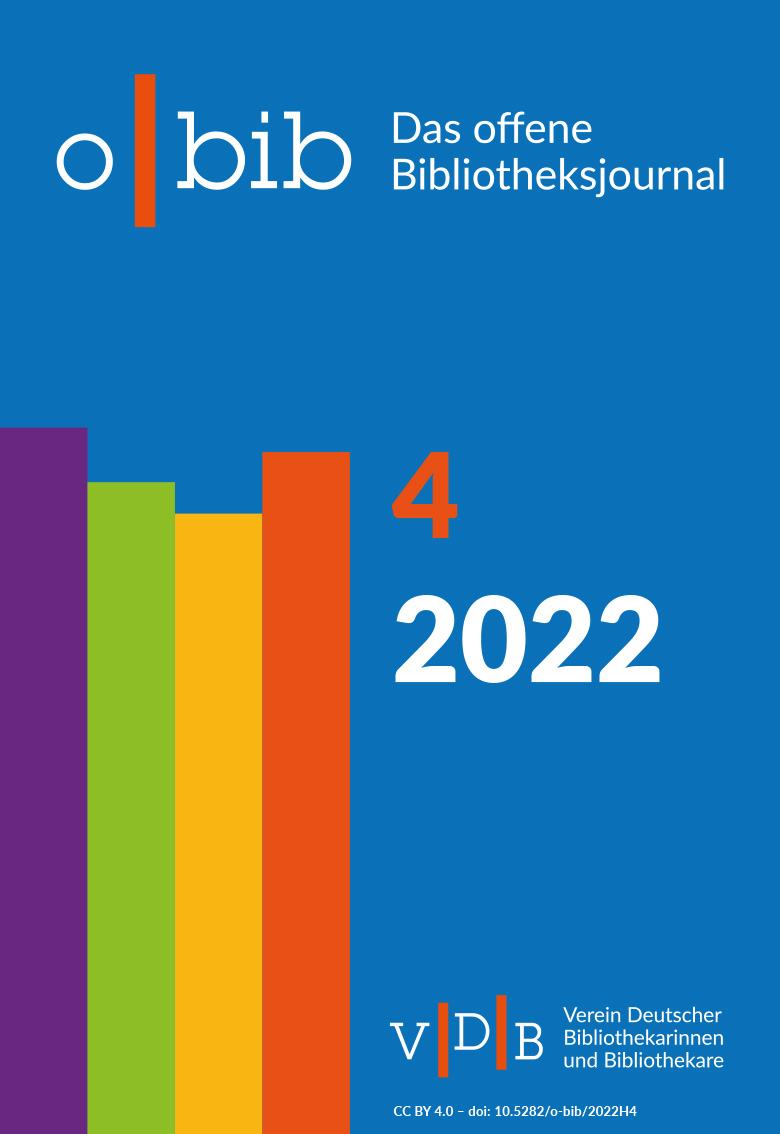Der Kitodo Entwicklungsfonds
Open Source Softwareentwicklung kooperativ finanzieren und gestalten
DOI:
https://doi.org/10.5282/o-bib/5845Keywords:
Open Source Software, Nachhaltige Softwareentwicklung, Kitodo, Digitalisierung, EntwicklungsfondsAbstract
Open source software is threatened by aging processes that endanger the sustainability of the soft- ware without targeted control. This paper presents the Kitodo Development Fund as an approach to address this aging process in a continuous way. Kitodo is three things in one – a widely used open source solution for producing and presenting digital objects, a community, and a non-profit association. Kitodo.Production is the workflow management module of the Kitodo suite that is used in more than 50 institutions in Germany. The development fund represents a model of how the association and the community together have successfully established a funding and controlling process to solve the risk of obsolescence.
References
Bonte, Achim: Chancen und Fallstricke offener, kooperativer Softwareentwicklung. Das Beispiel Kitodo, in: Bonte, Achim; Rehnolt, Juliane (Hg.): Kooperative Informationsinfrastrukturen als Chance und Herausforderung, Berlin 2018, S. 182–192. Online: https://doi.org/10.1515/9783110587524-022.
Brügge, Bernd; Harhoff, Dietmar; Picot, Arnold u.a.: Open-Source-Software. Eine ökonomische und technische Analyse, Berlin 2004 (Springer eBook Collection Business and Economics). Online: https://doi.org/10.1007/978-3-642-17024-9.
Coad, Peter; Lefebvre, Eric; DeLuca, Jeff: Java modeling in color with UML. Enterprise components and process; enrich the content of your models, become a better modeler by example, deliver frequent, tangible, working results, Upper Saddle River, NJ 1999.
Finck, Matthias; Hermann, Elena (Hg.): Abschlussbericht Kooperative Weiterentwicklung der quelloffenen Digitalisierungssoftware Kitodo.Production, Elmshorn 2019. Online: https://doi.org/10.5281/zenodo.6779479.
Finck, Matthias: Usability-Engineering in der Open-Source-Softwareentwicklung, Zugl.: Hamburg, Univ., Diss., 2007, Sierke, Göttingen 2007.
Hars, Alexander, & Ou, Shaosong (2002). Working for Free? Motivations for Participating in Open-Source Projects, in: International Journal of Electronic Commerce 6 (3), 2002, S. 25–39. Online: http://www.jstor.org/stable/27751021.
Hippel, Eric von; Krogh, Georg von: Open Source Software and the “Private-Collective” Innovation Model. Issues for Organization Science, in: Organization Science 14 (2), 2003, S. 209– 223. Online: https://doi.org/10.1287/orsc.14.2.209.14992.
Huber, Kathrin; Strötgen, Robert: Und nun? Der Weg vom Projekt zur kontinuierlichen Produktentwicklung, in: Finck, Matthias; Hermann, Elena (Hg.): Abschlussbericht Kooperative Weiterentwicklung der quelloffenen Digitalisierungssoftware Kitodo.Production, Elmshorn 2019, S. 72–80. Online: https://doi.org/10.5281/zenodo.6779479.
Meyer, Sebastian; Huber, Kathrin: Konsequent Modular. Ein offenes, modernes Architekturkonzept, in: Finck, Matthias; Hermann, Elena (Hg.): Abschlussbericht Kooperative Weiterentwicklung der quelloffenen Digitalisierungssoftware Kitodo.Production, Elmshorn 2019, S. 40–49. Online: https://doi.org/10.5281/zenodo.6779479.
Vassallo, Carmine; Grano, Giovanni; Palomba, Fabio u. a.: A large-scale empirical exploration on refactoring activities in open source software projects, in: Science of Computer Programming 180, 2019, S. 1–15. Online: https://doi.org/10.1016/j.scico.2019.05.002.
Wolf, Henning; Bleek, Wolf-Gideon: Agile Softwareentwicklung. Werte, Konzepte und Methoden, Heidelberg 2011.
Downloads
Published
Issue
Section
License
Copyright (c) 2022 Robert Strötgen, Matthias Finck

This work is licensed under a Creative Commons Attribution 4.0 International License.





